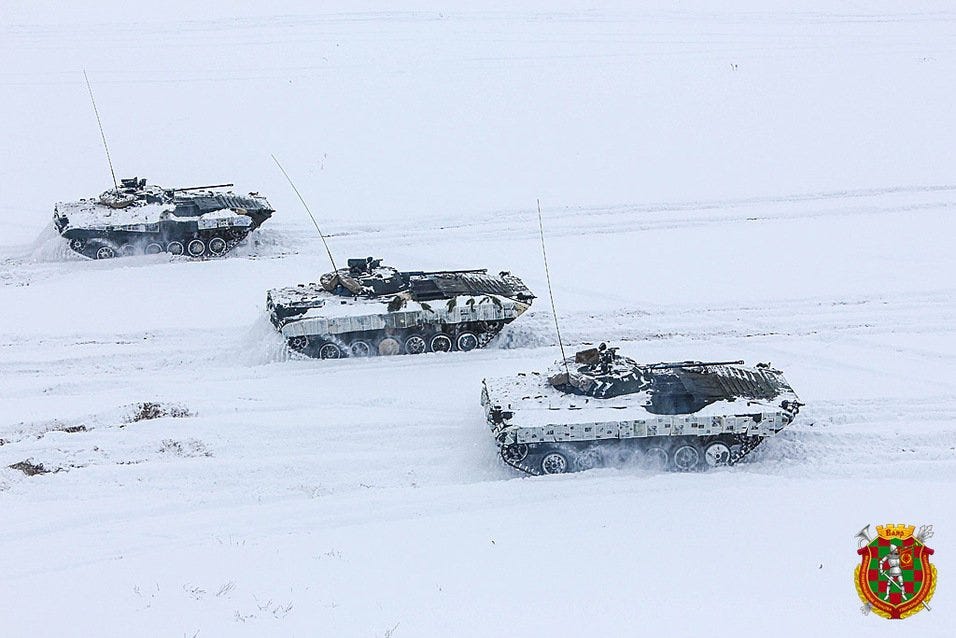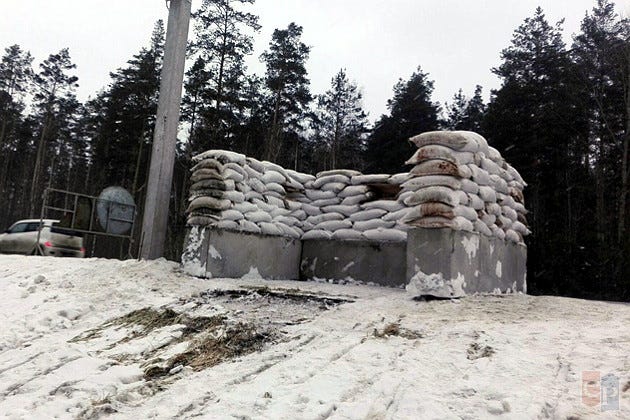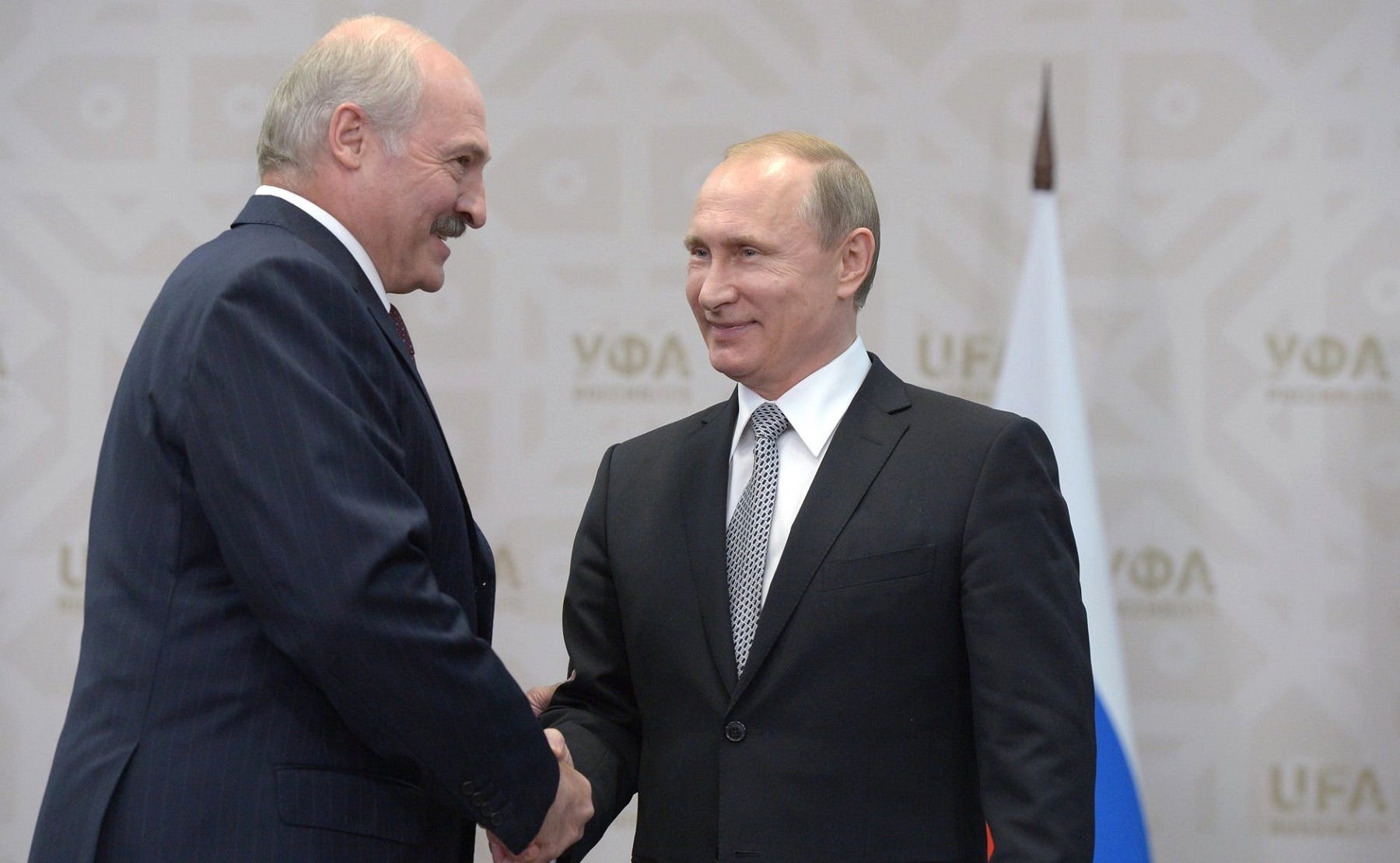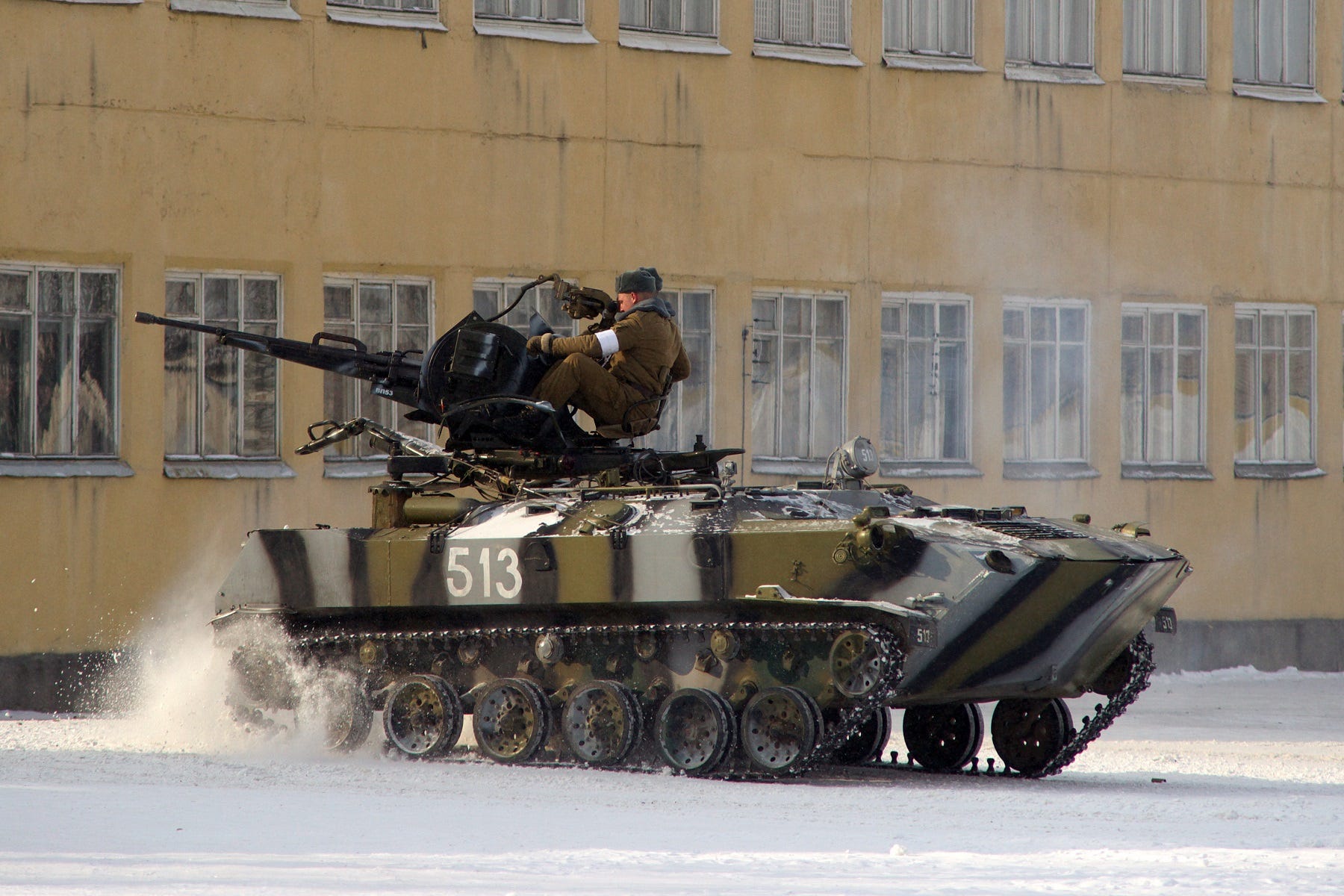You are using an out of date browser. It may not display this or other websites correctly.
You should upgrade or use an alternative browser.
You should upgrade or use an alternative browser.
Is Belarus preparing for a Ukraine-like invasion?
- Thread starter ☑︎#VoteDemocrat
- Start date
More options
Who Replied?ADevilYouKhow
Rhyme Reason
Uh oh!
Uh oh!
Belorussian cocktail shakes
1 hr ago

Belorussian innovation, BMP-2 camouflages made from old newspapers. Easy, fast and environmentally friendy
Few things in Europe have been as stable as Belarus. It has been a staunch ally of the Putin regime. Belarus and its leader Alexander Lukashenko, have participated in Russian led Eurasian Economic Union and the two nations have tried to establish a supranational confederation. While the nations are closely knit with economic ties the progress on the confederation has been slow. Recently rumors have been circulating that President Lukashenko has been reluctant to relinquish control of his nation. The old collective farm head has after all ruled Belarus with an iron grip since 1994.
Up until 2017 the disputes between Belarus and Russia have stayed mostly under the radar. Only some disputes involving the Russian energy giants have received any attention in the international media. Against this backdrop most analysts dealing with Belarus were surprised, when the Russian newspaper Kommersant published a story that President Lukashenko was going to pull Belarus out of most co-operation mechanisms with Russia. This would be a major blow to the EEU that is one of the pet projects of the Russian President Vladimir Putin. Kommersant speculated that Lukashenko would announce the move in his annual speech.
President Lukashenko has recently made moves to please the European nations. Belarus lifted visa requirements from citizens of 80 countries. This move at least partially prompted Russian FSB to re-establish border controls between Belarus and Russia. One reason for the cooling relations between Moscow and Minsk is the economic downfall that has clutched both nations. Belarus owes Russia over half a billion dollars for gas and petrol. Russia has also repeatedly requested Belarus to give Russian air-force a permanent base in Belarus.
Kommersant article coincided with an announcement that large parts of the Belorussian army were going to deploy out on training maneuvers. Regular troops would be joined by a large number of reservists being called up for refresher training. Belorussian army has been traditionally positioned to defend the country from attacks coming from its western NATO neighbors.

Belorussian fortification built along the Minsk — Moscow highway
This time the heavy mechanized forces deployed east from the capital Minsk. Troops began building field fortifications and defensive positions facing Russia along the Minsk — Moscow highway. This is the first time in decades that Belorussian troops have turned their tanks against Russia. As the exercise progressed it was confirmed that over 3000 reservists were called in. These were mostly older officers and NCOs. This could indicate that Belarus is currently preparing for a full scale mobilization.
Speculations are running wild about what the real situation is and what is going to happen next. I’ve sketched 3 possible scenarios:
1) Belarus breaks ties with Russia to close with the EU. This would cause strong economic and political reactions from Moscow. Military intervention by Russia is possible, but not probable.
2)The crisis is fabricated for domestic Belorussian consumption. Lukashenko will use the heightened tensions to strong-arm economic help from Russia.
3) The whole political crisis is just “maskirovka”, deception, the real goal is to mask the mobilization of the Belorussian army. Belarus is essential in all Russian battle plans that involve either Ukraine or the Baltic. There is a straight highway from the Belorussian defensive positions to Kiev.
The scariest alternative is that Russia demanded that Belarus would participate in number 3, but the Kremlin plans were too evil even for a pseudo-dictator like Lukashenko.
@GzUp @wire28 @Atlrocafella @Blessed Is the Man @ezrathegreat @Jello Biafra @chicken Pot Pie @humble forever @Darth Nubian @General Mills @88m3 @GinaThatAintNoDamnPuppy! @BaggerofTea @Keyser Migraine @Sagat @Hollywood Hogan @Marcus Going @DonKnock
Berniewood Hogan
IT'S BERNIE SANDERS WITH A STEEL CHAIR!
"Conservative patriots" for decades: "RUSSIAN AGGRESSION AGAINST FREE PEOPLES MUST BE STOPPED AT ALL COSTS!!!!!"
"Conservative patriots" now: " "
"

"Conservative patriots" now: "
 "
""Conservative patriots" for decades: "RUSSIAN AGGRESSION AGAINST FREE PEOPLES MUST BE STOPPED AT ALL COSTS!!!!!"
"Conservative patriots" now: ""
https://warisboring.com/belarus-pre...ictator-knocks-russia-86384fd2a468#.j34caa7oq
Belarus Prepares for Hybrid War as ‘Europe’s Last Dictator’ Knocks Russia
Well, this is alarming
2 days ago

Belarusian president Alexander Lukashenko shakes Russian president Vladimir Putin’s hand in July 2015. Kremlin photo
by ROBERT BECKHUSEN
Belarusian president Alexander Lukashenko, often called “the last dictator in Europe,” had long kept his country aligned politically, economically and militarily close to Russia. But this relationship deteriorated after the Russian invasion of Crimea — and as Lukashenko began to hedge, albeit slowly and very cautiously, toward the West.
Given that context, several recent events have been disquieting.

In a more than seven-hour news conference on Feb. 3, 2017, Lukashenko blasted Russia for reimposing border controls — a response to Belarus relaxing visa rules for foreign visitors — and categorically rejected a Russian plan to build an air base on Belarusian soil.
Lukashenko also ordered the arrest of Russia’s top food safety official, and accused Russian president Vladimir Putin of “practically appointing Trump.” The strongman further criticized Russia for sharply cutting oil exports to Belarus.
“Russia has become concerned that Belarus will go away, that Lukashenko has turned to the West,” he said.
Given the tensions involved, the Belarusian potentate took time to caution that “there will be no war … no one will occupy us, no one will send in troops. We will protect ourselves and our independence.”
The situation is strange. On Feb. 4, the Associated Press published a story that contained a random and disturbing anecdote that White House “national security aides have sought information about Polish incursions in Belarus, an eyebrow-raising request because little evidence of such activities appears to exist.”
And on Feb. 5, the Belarusian strongman gave kudos to a “fraternal Ukraine” which is “fighting for its independence” — noting that he was referring to an economic fight. Just days before, the Belarusian military conducted a large readiness test.
Separately, these reports — especially the one sourced from Donald Trump’s White House — and Lukashenko’s knocks on Russia are noteworthy. In a series, they’re quite remarkable. TV Rain, a Russian independent news channel, described the row as the “worst crisis” between Belarus and Russia in their recent history.

A Belarusian BTR-D armored vehicle. Serge Serebro photo via Flickr
The causes of the present crisis are complicated. Belarus retains a largely state-managed economy carried over from the Soviet Union. Lukashenko, a former collective farm manager, has been president since 1994 thanks to rigged elections which he has openly boasted about.
Belarus’ economy heavily depends on a combination of Russian oil — which it refines — and subsidies, along with back-and-forth trade to Europe. But Western sanctions on Russia and a decline in oil prices have pummeled the Belarusian economy, which is in a severe recession.
Lukashenko has begun to experiment. Liberal advocates from the West now meet with Belarusian officials, which was unprecedented until recently. But Belarusians are hurting. Russia has cut its oil exports to Belarus by half, and pushing too fast on reforms could threaten the stability of Lukashenko’s regime.
“With the status quo of the past two decades looking increasingly unsustainable, some regard his predicament as unenviably similar to that of Mikhail Gorbachev in the 1980s,” Foreign Policy observed in September 2016.
Fortunately for Lukashenko, Western countries have given up on trying to reform his authoritarian ways, and in 2016 the European Union lifted most sanctions it imposed because of the regime’s abysmal human rights record.
Meanwhile, Russian state-controlled media outlets have aired speculative stories that the West could topple the Belarusian government or provoke instability. Irredentist, nationalist commentators have even taken to advocating for the absorption of Belarus’ territory … by force, if necessary.

Arseni Sivitski, a reserve officer in the Belarusian military and the director of the Minsk-based Center for Strategic and Foreign Policy Studies, believes a Russian invasion of Belarus modeled on Eastern Ukraine is plausible — although the likelihood of such an event is impossible to predict.
He drew that conclusion from the political situation and the Belarusian army’s own preparations — including exercises in 2016 and a change in military doctrine to prepare for a “Donbass-like hybrid scenario,” Sivitski wrote.
“Belarusian military strategists simulated a situation in which a hypothetical foreign adversary provoked an internal armed conflict in the country with the help of reconnaissance and sabotage groups and illegal armed formations.”
“The Belarusian Armed Forces have been practicing neutralizing illegal armed groups, securing and releasing captured critical infrastructure objects, and neutralizing separatist groups backed from abroad,” Sivitski added. “Assigned tasks also included establishing temporary checkpoints on the state border and main road routes and conducting surveillance along the border.”
Sivitski also observed that publicly available logistics data from the Russian Ministry of Defense indicates that it plans to send more than 4,000 railway carriages to Belarus in 2017, compared to anywhere from 50–200 carriages annually between 2013–2016.
Belarus and Russia regularly team up for military exercises. But that’s an unusually large amount of freight. Two hundred carriages can support a single motorized rifle brigade. Four thousand can support…
“…a number of troops to Belarus almost equal to the 1st Guards Tank Army of the Western Military District, and not simply participate in regular military drills.”
Now the intentions are speculative and hypothetical — and the freight could very well be for an exercise … or some other reason. Sivitsi noted that the timing of the Ministry of Defense release came a week before a trip by Lukashenko to Moscow in November 2016.
Thus, the data could be a means of “putting psychological pressure on Minsk in order to bring Belarus into line with the Kremlin.” Intimidation.
In any case, this isn’t the first time Belarus and Russia have experienced tensions. And Minsk is still closer politically to Russia — and to Putin — than it is to the West. Lukashenko is not the kind of dictator who moves fast.
Russia may also seek to deploy troops in Belarus to match a NATO tank buildup in Poland. But what happens if Lukashenko says no?
The Belarusian military with its 48,000 active duty soldiers and airmen — plus an additional 289,500 reservists — would have a difficult time resisting Russia.
Minsk’s air force has “questionable” serviceability, according to the International Institute for Strategic Studies, and the country “would not be capable of repulsing a serious incursion across its borders.”
Regardless, such a scenario would be a calamity. Keep a close eye on Belarus.

Will Belarus Be Putin’s Next Victim?
Another Kremlin-driven crisis may be coming to Eastern Europe
By John R. Schindler • 02/07/17 9:30am

A video screen displays Russian President Vladimir Putin speaking during his annual press conference in Moscow while journalists hold the name of their media, on December 23, 2016. NATALIA KOLESNIKOVA/AFP/Getty Images
Belarus rarely makes it into Western news reports, and hardly ever in a positive way. Governed since 1994 by Aleksandr Lukashenka, a Soviet-era throwback strongman—in a perfect touch, he once ran a Communist collective farm—Belarus for decades has been bemoaned as Europe’s last dictatorship thanks to its poor human rights record and less than democratic ways.
Lukashenka has shown little interest in currying Western favor until quite recently. His regime, guided by the strong hand of the secret police—still termed the KGB in fully Soviet fashion—has imprisoned and occasionally disappeared journalists and politicians who get on Lukashenka’s bad side. As full-time Soviet nostalgists, the regime and its leader have pined for days of lost Communist glory, and efforts at liberalization of the economy and society have made little progress in Minsk.
The ramshackle Belarusian economy remains mired in statist inefficiencies, and the only thing that has kept Lukashenka afloat all these years has been Kremlin help. Vladimir Putin long courted Minsk with loans and low prices on imported Russian energy, in exchange receiving Belarus as a vital buffer state against NATO and the West.
Its geographic location, bordering on three members of the Atlantic Alliance—Poland, Lithuania, and Latvia—gives Belarus an undeniable importance to Russia, one which has only increased since 2014, when Moscow’s ties to NATO soured after Putin annexed Crimea and invaded eastern Ukraine. Given perennial Russian fears of invasion from the west, Belarus looms large in Moscow’s military imagination—and war plans.
In practice, the Kremlin has long considered Belarus hardly more than an extension of Russia in security terms. For years, relations between Moscow and Minsk have been close in defense and intelligence matters, and joint military exercises with Russian and Belarusian forces have been commonplace. Since the latter uses Russian weapons and defense doctrine, and both armies speak the same language, the Kremlin has considered Belarusian forces to be fully interoperable with its own. In Russian war planning, Minsk’s military has counted in the Kremlin’s numbers.
That is changing, however, and the resulting alteration in the strategic balance in Eastern Europe has set off alarm bells in Moscow. There is irony here, since for years it was Lukashenka who wanted closer ties to the Kremlin, not the other way around, even expressing a desire for full political union with Mother Russia. Yet Putin was careful about getting too chummy with the dictator in Minsk, whose unsavory human rights record caused bad headlines on a touchy subject where Moscow didn’t need additional attention from Western governments and NGOs.
The White House is either parroting ridiculous Russian fake news or it is consciously pushing Kremlin disinformation on our Intelligence Community.
Over the last couple years, however, Lukashenka has been quietly distancing himself from his longtime patron, seeking discreet ties with the West. Here the Kremlin’s reducing some of its financial aid to Belarus—for instance, cutting back supplies of cheap oil—has been a key factor. In reply, Minsk’s position on controversial topics like Ukraine has grown less supinely pro-Russian than Putin expects from longtime clients. Lukashenka’s increasingly pro-Ukrainian position is now out in the open, as revealed by his recent statement that “brotherly Ukraine” is fighting for its independence. Although the Minsk strongman was politic enough to omit whom his neighbor is struggling for independence from, the message was received clearly in Moscow.
Relations between Moscow and Minsk are now on the verge of full-blown crisis. Last week, Lukashenka said that the new airbase which Putin plans to put in his country to serve the Russian air force wasn’t going to happen, lashing out at Moscow in an epic press conference that lasted more than seven hours and brimmed with anti-Kremlin sentiments. In response to deteriorating relations, Moscow has reinstated border controls on its western frontier. The previously unguarded frontier with Belarus will now be patrolled by the Federal Security Service, Putin’s powerful FSB.
Lukashenka is deeply worried that the displeased Kremlin may try to overthrow his regime, replacing him with someone more pliant to Putin’s wishes. Minsk fears the sudden appearance of Little Green Men, saboteurs and terrorists from Russian intelligence, the shadowy operatives who led the invasion of Crimea three years ago, trying to evict him from power. Here Lukashenka’s fears are entirely valid, and he faces the difficult predicament that, given the exceptionally close ties between his KGB and Kremlin security services – most Belarusian security higher-ups have been trained in Russian spy schools—he can’t be sure who in Minsk is really on his side.
Therefore, it’s no surprise that Lukashenka is flexing his muscles right now, trying to send a message of strength while assessing who in Belarus is loyal to whom. There’s a major military exercise underway right now that includes building obstacles on the main highway that runs from Minsk to the Russian border. Reservists have been called up for these exercises, including retired military officers returned to service, to practice stemming a possible Russian invasion.
Arseniy Sivitskiy, director of Minsk’s Center for Strategic and Foreign Policy Studies, which is Belarus’ only think-tank devoted to such matters, in a new interviewsuggests that Putin may be using the current chaos in Washington, with the still-forming Trump administration seemingly at sea about which direction its foreign policy will take, to move against Lukashenka. What’s coming may range from subversion and intimidation by Russian intelligence to all-out invasion, according to Sivitskiy. Although Sivitsky doubts that the worst-case scenario will happen, the real nightmare is that Moscow may resort to the use of tactical nuclear weapons against NATO if any aggression against Belarus does not go according to Russian plans.
Then there’s the knotty issue of what exactly the White House would do. Belarus isn’t in NATO and it cannot expect overt Western help against Putin. But would President Trump do anything at all in the event of Russian aggression against yet another neighbor? The new administration’s repeated public fawning over the Kremlin, plus its exceptionally tepid support for Ukraine as fighting increases there between the Russian military and Kyiv’s forces, provide ample room to wonder which side Trump is really on here.
Not to mention the weird question which the White House recently asked the Intelligence Community about Belarus. According to a new AP report, “national security aides have sought information about Polish incursions in Belarus.” It should be noted that Poland, a stalwart NATO member, has conducted zero incursions into Belarus, and the notion is frankly bizarre outside the paranoid halls of the Kremlin and pro-Russian websites that seek to stir up anti-NATO sentiments with fake news.
However, Polish military incursions into Belarus have featured prominently in recent Russian military exercises, namely ZAPAD (West) 2009 and 2013, where a Drang nach Osten by Warsaw was the exercise scenario—twice. Therefore, the White House is either parroting ridiculous Russian fake news or it is consciously pushing Kremlin disinformation on our Intelligence Community.
Neither option bodes well for security and stability in Europe right now. Belarus is on NATO’s doorstep, unlike Crimea or eastern Ukraine, and the possibility for any military crisis there spiraling dangerously out of control is real. It would be best for all sides if any such crisis is averted before it unfolds.
John Schindler is a security expert and former National Security Agency analyst and counterintelligence officer. A specialist in espionage and terrorism, he’s also been a Navy officer and a War College professor. He’s published four books and is on Twitter at @20committee.
Last edited:
They want their money 


 Beldetenland
Beldetenland